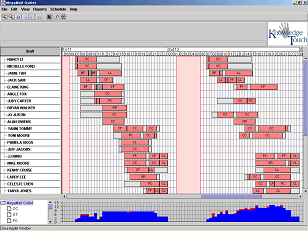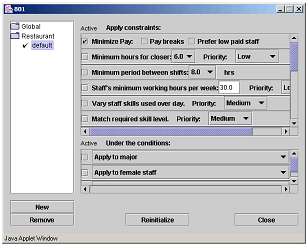|
PeopleScheduler™ |

|
| Knowledge
Touch’s PeopleScheduler is the leading web-based scheduling
system for creating optimized workforce schedule. PeopleScheduler
obeys your operation rules and business policies when generating
the optimized schedule to fulfill the staffing demand of your
organization. It takes into account the staff availability,
staff skill set and the demand for each station (at 15 minutes
interval) each day.
PeopleScheduler approaches the staff scheduling
problem by translating it into a mathematical model and then
using optimization technology to solve it. The PeopleScheduler’s
fast optimization engine is capable of generating the computerized
schedule within a few minutes for the planner. The complexity
of the optimization is handled internally by PeopleScheduler
and is totally hidden from the planner. PeopleScheduler provides
a very user-friendly, graphical front-end interface for the
planner to interact with the system.

|
Within
PeopleScheduler, there are 4 main modules:
Schedule Module: This is
the main module where the schedule is being planned and generated.
It has an interactive Gantt Chart for working with the schedule.
The scheduling constraints and rules for the store are also
defined in this module.
Reports Module: This module
allows the generation of several reports such as Labor Cost,
Crew Assignment, Coverage Chart, Weekly Exception and Unassigned
staff.
Administration Module: This
module defines the data needed for the scheduling such as
staff availability, staffing demand for the station, operations
hours, Floor Positioning (Manning) Guide. The Store and Staff
details can be edited/created in this module.
Data Wizard Module: This
module enables the import of data into PeopleScheduler from
other systems (payroll, HR, legacy system, etc) via simple
flat file interface.
Benefits of PeopleScheduler
» Generate optimal workforce schedule
that deploys employees efficiently to meet service quality
level and cost constraint.
» Reduce
labor cost by minimizing excess labor.
» Fast
scheduling to save you planning time.
» Use
it as tactical tool to conduct “what-if” analysis.
Highlight staff training/hiring needs.
» Cost-effective
web-based IT deployment.
The Interactive Scheduling Process
The main part of scheduling process occurs in this PeopleScheduler
interactive Gantt Chart interface. In this GUI, the staffs
are listed on the left panel while the schedule is represented
in the Gantt Chart to the right. Each colored block with a
label represent an activity for the staff whose name appear
on the left panel.
There is a time scale at the top of the Gantt
Chart to indicate the start and end time of each activity.
The zoom in/out feature enables the time scale to be changed
easily.
The
resource utilization graph for each station is located below
the Gantt Chart. The graph shows the manpower coverage level
at every half-hour interval. Any over-supply or under-supply
of staff will be indicated clearly from the graph.
|
Setting
constraints
For the scheduling engine to obey your company operation polices
and legal regulations, these constraints can be set using the
Policy Editor (see right centre). This Policy Editor allows
the selection of suitable constraints to be activated for scheduling.
These constraints include:
»
Staff
maximum consecutive working days
»
Staff
maximum working days per week
»
Staff
maximum working hours per week
»
Staff
minimum working hours per week
»
Minimize
total pay
»
Maximum
skills per shift, per staff
»
Vary
skills used over week
»
Match
required skill level
»
Staff’s
break/rest period entitlement
»
Minimum
skill duration
»
Meet
staff preferred minimum hours per week
These constraints can be customized at store
level and be applicable under specified conditions (based
on gender, age or day type). After the policies are configured,
the user will then invoke the scheduling engine to create
the schedule.
Manipulating the schedule
The Gantt Chart allows the user to make changes to the generated
schedule such as extending the duration, inserting new activity,
changing the station, deletion of activity, freezing activity.
Drag and Drop feature is also available for quicker and more
intuitive manipulation of the activity. After these changes
are made, the user can still invoke the scheduling engine
to re-generate the schedule based on those changes. This re-scheduling
ability offers great flexibility in schedule
planning.
Technical Architecture
PeopleScheduler has a web-based, multi-tier architecture to
support quick and flexible deployment. It is built on Java
technology (JDBC, Servlet) and uses leading optimization components
in the scheduling engine. The supported platforms, databases,
third party software are as follows:
Operating
System: IBM AIX, Sun Solaris, Linux, Microsoft Windows
Database: IBM Informix, Microsoft SQL Server,
PostgreSQL, Oracle
Servlet Container: Jakarta-Tomcat
Java Runtime Environment: JRE version 1.3.1
Optimization component: ILOG CPLEX, Knowledge
Touch Opti-Server
|



WANT
TO KNOW MORE? CLICK
HERE |
|
|







